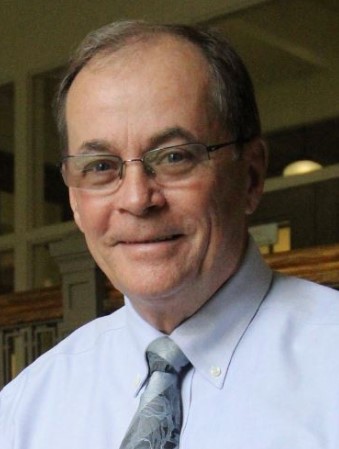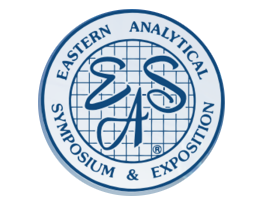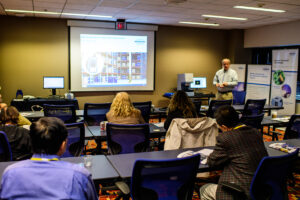Two-Day Course
Sunday, Nov. 14 & Monday, Nov. 15; 8:30am – 5:00pm
Dr. Thomas Brettell, Cedar Crest College, Allentown, PA
COURSE DESCRIPTION
This two-day course presents the fundamentals of gas chromatography with an emphasis on practical applications for users and method developers. Topics to be covered include theoretical considerations, data analysis, recent developments in instrumentation, including inlet, column, and detector technology, and the applications of these to effective qualitative and quantitative analysis. The theoretical portion of the course will focus on using the fundamental understanding of the chromatographic process (limited number of equations and comparisons to extractions and distillations) to assist in obtaining a desired separation quality and run time. Modern instrumentation including split, splitless, on-column, and programmed-temperature inlets and electronic pressure control will be discussed. The proper selection of capillary columns to solve practical problems will be described, although the utility of modern packed columns will be briefly discussed. An emphasis will also be placed on detectors, including TCD, FID, ECD VUV detector, and GC/MS. Finally, all this will be applied to practical problems in qualitative and quantitative analysis.
WHO SHOULD ATTEND
This course represents a balanced blend of pertinent information and underlying theory for successful practice of gas chromatography. Individuals working with gas chromatography, beginners and those desiring to update their knowledge of the technique will find this course to be meaningful and useful. The instructor of this short course will welcome questions and problems pertinent to the subject material covered in the course prior to the meeting. These questions & problems will be answered in a Question & Answer Session at the end of the course.
TOPICS
1. Theory and Basics
a. Evolution of chromatography
b. IUPAC nomenclature
c. Similarities to extractions & distillations
d. Theory of gas chromatography-Plate and Rate Theories
e. Effect of changing conditions on peak separations
2. Inlets/mobile Phases
a. Injection modes & mobile phases
b. Instrumental requirements for packed and capillary columns
c. Capillary column inlets (split, splitless, on- column, direct injection, electronic pressure control)
d. Programmed-temperature vaporizer, large volume injections
e. Packed column inlets /column selection
f. Classification and selection of stationary liquid phases and adsorbents
g. Capacity and analysis time
3. Capillary Column
a. Capillary column selection
b. Chromatographic parameters affecting column performance
c. Effect of capillary column ID, film thickness, length & choice of carrier gas on resolution
d. Capillary column rinsing, rejuvenation, care and maintenance
4. Detectors
a. Fundamentals of detector responses
b. Types of detectors
c. Detectors used for various analysis
5. Computer Assistance in Gas Chromatography
a. Internet guidance
b. Software for prediction and optimization of separations
6. Qualitative and Quantitative Analysis
a. Qualitative analysis
b. Quantitative analysis methods
*NOTE: This course covers gas chromatography, not the technique of gas chromatography-mass-spectrometry (GC-MS). Modern Practice of Gas Chromatography; 4th Edition, Robert L. Grob and Eugene F. Barry, Eds.; John Wiley & Sons: New York, 2004. ISBN 0-471-22983-0

Dr. Thomas A. Brettell, is Professor of Chemistry and Chair of the Chemical & Physical Sciences Department of Cedar Crest College where he teaches advanced separation and forensic chemistry courses in the undergraduate and graduate forensic science programs. He previously served for 31 years in the New Jersey State Police Office of Forensic Sciences, where, as Director, he oversaw the operation of the State’s regional forensic laboratory system. Dr. Brettell received his BA in Chemistry from Drew University (1973) and a Ph.D. in Analytical Chemistry from Villanova University (1987). He is a past President of the Chromatography Forum of the Delaware Valley. Tom was presented the Chromatography Forum of the Delaware Valley Award in 1997 for service to the Forum and accomplishments in the field of separation science. He has been active in leadership positions in national and international forensic science professional organizations, most recently serving on the National Institute of Standards and Technology (NIST) Seized Drug Subcommittee of the Organization of Scientific Committees (OSAC) to develop federal standards and guidelines to improve Forensic Science. He presently serves as Commissioner Academician on the Forensic Education Programs Accreditation Commission. He is certified in the area of General Criminalistics by the American Board of Criminalistics and a Fellow with the American Academy of Forensic Sciences (AAFS).

